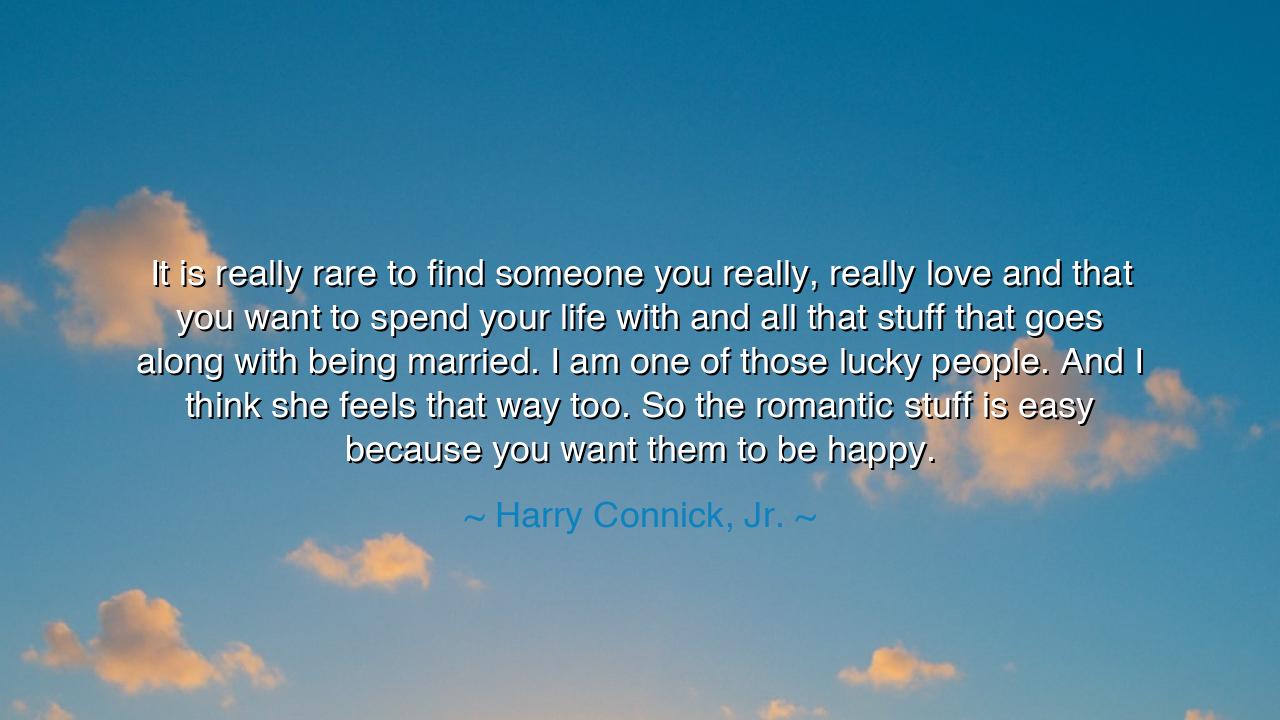
It is really rare to find someone you really, really love and
It is really rare to find someone you really, really love and that you want to spend your life with and all that stuff that goes along with being married. I am one of those lucky people. And I think she feels that way too. So the romantic stuff is easy because you want them to be happy.






Harry Connick, Jr., musician of soul and bearer of simple yet profound truths, once said: “It is really rare to find someone you really, really love and that you want to spend your life with and all that stuff that goes along with being married. I am one of those lucky people. And I think she feels that way too. So the romantic stuff is easy because you want them to be happy.” Though spoken in a humble tone, these words are a hymn of gratitude, a recognition that true love—the kind that endures a lifetime—is not a common gift, but a treasure granted to the fortunate few.
The origin of this wisdom lies in the experience of companionship. Connick speaks as one who has tasted fame, success, and the glitter of worldly applause, yet declares that the rarest prize is not found on the stage but in the quiet devotion of marriage. His words echo the ancient belief that the heart longs not for fleeting pleasure, but for a union of souls that can endure the years. Thus, he teaches that romance is not sustained by grand gestures alone, but by the daily desire to make the beloved happy.
History gives us shining examples of this truth. Consider Queen Victoria and Prince Albert, whose marriage was not only a union of state but of deep affection. Though surrounded by wealth and ceremony, what sustained them was not duty but genuine devotion. After Albert’s death, Victoria’s grief revealed how rare and powerful their bond had been. She mourned him for the rest of her life, proving that the greatest legacy of their reign was not empire, but love. Their story confirms Connick’s words: to find a soul to spend one’s life with is rare indeed, and when found, it makes every act of affection natural, every “romantic stuff” easy.
Or recall the life of John Adams and Abigail Adams, whose letters survive as testimony to their unbreakable bond. Across the storms of war, separation, and the burden of nation-building, they cherished one another with humor, wisdom, and unshakable loyalty. In their words, we see the same truth Connick voices: that when love is true, it transforms sacrifice into joy, and turns duty into a gift. Their partnership was not merely survival—it was a companionship of souls, rare and enduring.
The meaning of Connick’s words, then, is this: love that lasts is not built upon passion alone, but upon the steady choice to seek the joy of the other. When two souls both desire the other’s happiness above their own, then marriage becomes not a burden but a blessing, not a battlefield but a sanctuary. And when such love is present, romance flows naturally, for affection is no longer a performance but the honest outpouring of gratitude.
The lesson for us is clear: do not chase after shallow notions of love, nor believe that beauty, wealth, or charm are its foundation. Seek instead the rare soul whose presence brings peace, whose joy becomes your joy, whose sorrow you would gladly bear. When you find such a one, cherish them with all your strength, for such love is rarer than gold. And once found, nurture it daily with acts of kindness, patience, and devotion, for these are the waters in which love flourishes.
Practical wisdom follows: each day, perform one act solely for the happiness of your beloved, without thought of return. Speak words of encouragement when weariness sets in. Choose to forgive swiftly, to listen attentively, to honor consistently. Remember that romance is not labor when it is rooted in love—it is the natural song of the heart that rejoices in the beloved’s joy.
Thus Harry Connick, Jr.’s simple words stand as ancient wisdom clothed in modern dress: true love is rare, but when found, it makes life a hymn of gratitude. Be brave in seeking it, humble in receiving it, and steadfast in nurturing it. For to love and to be loved in this way is to live not merely long, but deeply, and to find in another’s happiness the highest fulfillment of one’s own.






AAdministratorAdministrator
Welcome, honored guests. Please leave a comment, we will respond soon